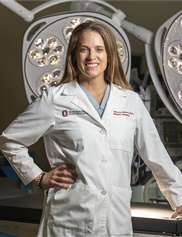Why Choose a Board-Certified Plastic Surgeon
Choose a board-certified plastic surgeon and be confident you are in the care of a highly trained surgeon you can trust.

During a consultation, a plastic surgeon listens to the patient's goals and concerns. They may also make recommendations for the patient based on medical history and other factors.
The consultation is also an opportunity to ask questions, and many patients find that the answers to these questions help to inform or refine their goals. It is always recommended to think through and write down questions ahead of the consultation for reference. Below are some of the most common questions you should ask your plastic surgeon.
The first question that a patient should ask any plastic surgeon is whether or not they are certified by the American Board of Plastic Surgery. In fact, you should ask this question before requesting a consultation.
Physicians who are certified by the American Board of Plastic Surgery have completed six years of rigorous training in plastic and reconstructive surgery. Obtaining this certification attests to a physician's extensive experience, training and prioritization of patient safety. The American Board of Plastic Surgery is the only officially recognized certifying body in plastic surgery.
Unfortunately, some physicians will say they are "board certified" without specifying which board has certified them. Vague language like this can be a red flag for patients because there are for-profit organizations that offer certification with far fewer competency requirements.
When consulting with a plastic surgeon, you should be prepared to discuss your goals and concerns. The plastic surgeon can then use this information to ask additional questions and help you decide what procedure is right for you.
It may seem counterintuitive for a patient to ask their physician which procedure is best rather than simply stating a preference, but the truth is that each body is different. What may have been the right breast augmentation procedure for a patient's friend may not be the most effective or suitable approach for the patient.
A consultation is a great opportunity to gather more information about what costs a specific procedure may involve. Based on your surgeon's assessment and recommended treatment plan, your costs will vary individually. "Menu" style pricing is a red flag. Your surgeon's coordinator will be your contact to discuss costs and scheduling should you decide to proceed.
Selecting a plastic surgeon can be overwhelming when you are not sure what the results will be. A plastic surgeon should be able to provide an extensive photo gallery of their work so you can visualize potential outcomes.
However, there may be times when the outcome of a procedure does not match the patient's goals. This is why it's essential to have realistic expectations when it comes to your surgical outcome. It is important to inquire as to how the plastic surgeon would address this hypothetical issue if it were to occur. An experienced plastic surgeon should be able to discuss their approach to patient satisfaction following surgery, including:
When under the care of a physician certified by the American Board of Plastic Surgery, the risks and complications for a plastic surgery procedure are statistically very low. However, it is still important for patients to understand and consider any possible health risks.
One common concern is the risks associated with anesthesia. You should always ask what type of anesthesia you would receive (local or general), who will provide it and how you will be monitored while under anesthesia.
Even so, it is worth keeping in mind that, statistically, these procedures carry a very low risk of complications, and approaches to anesthesia are determined by the procedure being performed and a patient's medical history. Your surgeon will discuss any applicable risks as part of the consultation process.
Recovery timelines vary by procedure, medical history and other factors. You should ask about timelines for returning to work, taking care of your children, exercising and any other activities you typically perform.
During the consultation, you should also discuss your plans for the days immediately after the surgery. In the first days after the procedure, you may need additional support from a friend or family member to perform routine physical tasks and aftercare.
Your plastic surgeon may encourage you to set aside a few days without obligations for recovery, depending on the complexity of the procedure. This may involve local hotel stays if you are from far enough away or private-duty nursing care at the discretion of your surgeon.
It is important to have a realistic understanding of what to expect. One common physical restriction after a medical procedure is that patients may not lift more than ten pounds in weight for a few weeks afterward, which can be difficult if you have a physically demanding job or have small children.
This can be a good time to share any concerns you have if these temporary limitations do not feel feasible. The physician may have specific advice, or in certain situations, may recommend a less complex procedure.
Patients may also wish to ask specifically about aftercare, and the physician should offer detailed guidance. Thorough aftercare is important for minimizing your recovery time and preserving your results.
Depending on the procedure, your physician will recommend that a patient return periodically for postoperative care. This schedule is set by your physician and is part of the commitment to having surgery.
For some plastic surgeons, patient health and satisfaction are such priorities that they will not charge for routine postoperative visits. Understanding the physician's approach to any follow-up care can often be helpful and reassuring for patients.
The views expressed in this blog are those of the author and do not necessarily reflect the opinions of the American Society of Plastic Surgeons.















